ENG4U1 Reading Report: Exploring Themes in Three Day Road
VerifiedAdded on 2022/09/06
|7
|1760
|26
Report
AI Summary
This reading report analyzes Joseph Boyden's novel, *Three Day Road*, focusing on the complex relationships between Xavier, Elijah, and Niska, set against the backdrop of World War I and the Cree culture. The report delves into the themes of friendship, war, racism, and cultural identity, examining the impact of the conflict on the characters' lives and their connection to their heritage. The analysis explores the symbolism of the windigo, the significance of storytelling, and the contrast between traditional Cree beliefs and the experiences of the characters in the war. The report highlights the narrative structure, the use of multiple narrators, and the conflicts within the novel, including the internal struggles of the protagonists and their external conflicts with the war and societal pressures. The report also includes personal connections and reflections on the novel's impact, demonstrating a deep understanding of the text and its themes.
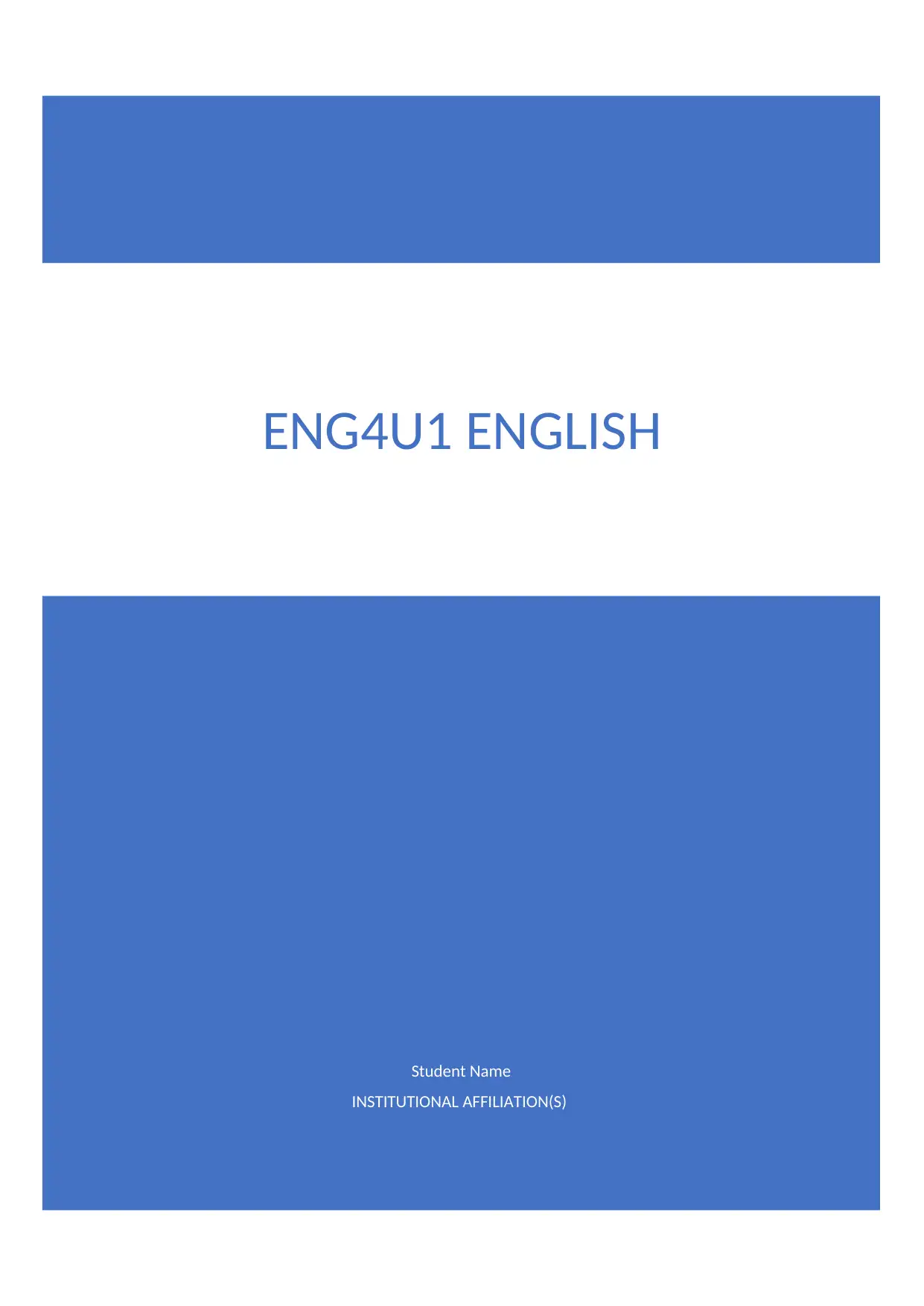
Student Name
INSTITUTIONAL AFFILIATION(S)
ENG4U1 ENGLISH
INSTITUTIONAL AFFILIATION(S)
ENG4U1 ENGLISH
Paraphrase This Document
Need a fresh take? Get an instant paraphrase of this document with our AI Paraphraser
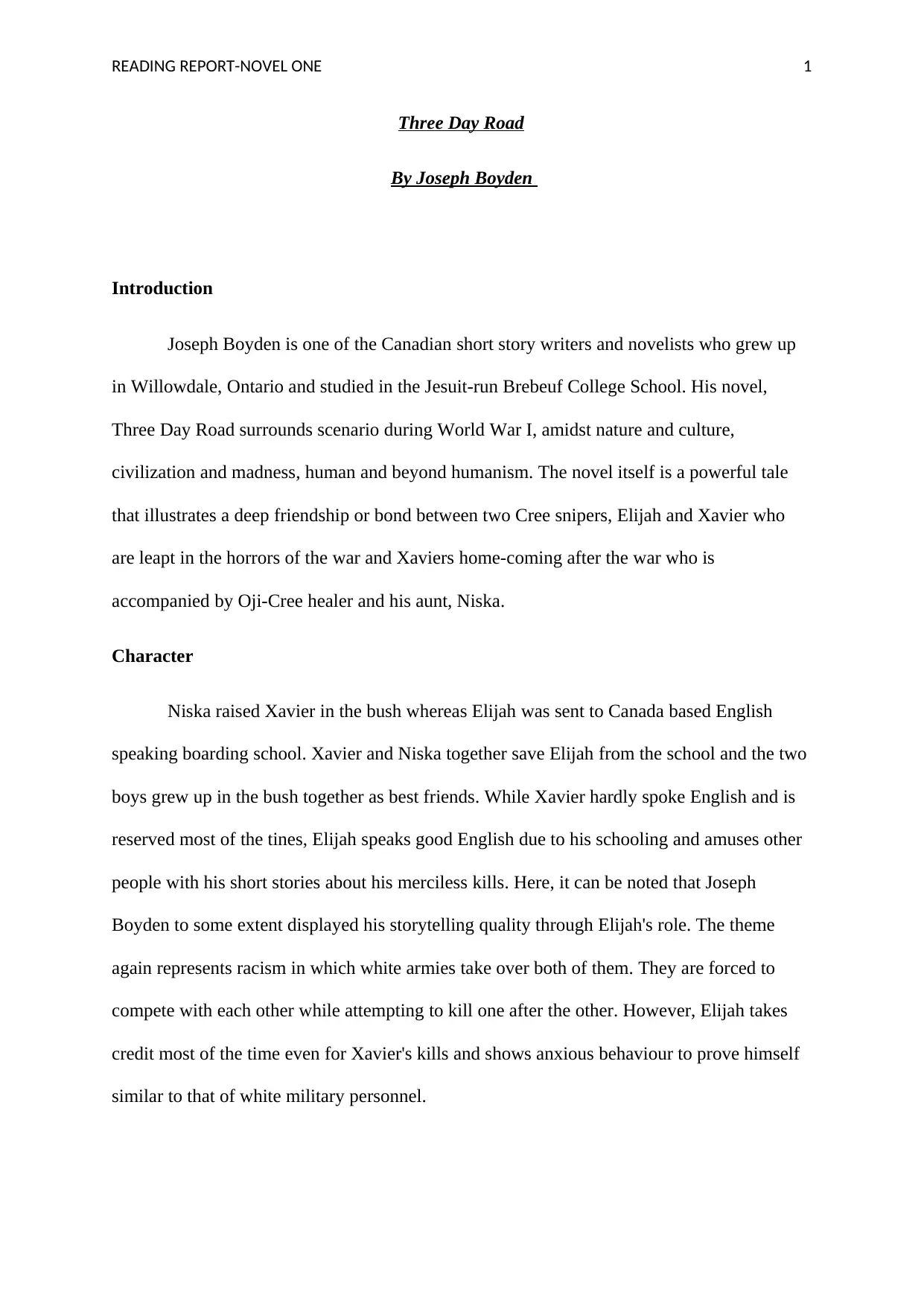
READING REPORT-NOVEL ONE 1
Three Day Road
By Joseph Boyden
Introduction
Joseph Boyden is one of the Canadian short story writers and novelists who grew up
in Willowdale, Ontario and studied in the Jesuit-run Brebeuf College School. His novel,
Three Day Road surrounds scenario during World War I, amidst nature and culture,
civilization and madness, human and beyond humanism. The novel itself is a powerful tale
that illustrates a deep friendship or bond between two Cree snipers, Elijah and Xavier who
are leapt in the horrors of the war and Xaviers home-coming after the war who is
accompanied by Oji-Cree healer and his aunt, Niska.
Character
Niska raised Xavier in the bush whereas Elijah was sent to Canada based English
speaking boarding school. Xavier and Niska together save Elijah from the school and the two
boys grew up in the bush together as best friends. While Xavier hardly spoke English and is
reserved most of the tines, Elijah speaks good English due to his schooling and amuses other
people with his short stories about his merciless kills. Here, it can be noted that Joseph
Boyden to some extent displayed his storytelling quality through Elijah's role. The theme
again represents racism in which white armies take over both of them. They are forced to
compete with each other while attempting to kill one after the other. However, Elijah takes
credit most of the time even for Xavier's kills and shows anxious behaviour to prove himself
similar to that of white military personnel.
Three Day Road
By Joseph Boyden
Introduction
Joseph Boyden is one of the Canadian short story writers and novelists who grew up
in Willowdale, Ontario and studied in the Jesuit-run Brebeuf College School. His novel,
Three Day Road surrounds scenario during World War I, amidst nature and culture,
civilization and madness, human and beyond humanism. The novel itself is a powerful tale
that illustrates a deep friendship or bond between two Cree snipers, Elijah and Xavier who
are leapt in the horrors of the war and Xaviers home-coming after the war who is
accompanied by Oji-Cree healer and his aunt, Niska.
Character
Niska raised Xavier in the bush whereas Elijah was sent to Canada based English
speaking boarding school. Xavier and Niska together save Elijah from the school and the two
boys grew up in the bush together as best friends. While Xavier hardly spoke English and is
reserved most of the tines, Elijah speaks good English due to his schooling and amuses other
people with his short stories about his merciless kills. Here, it can be noted that Joseph
Boyden to some extent displayed his storytelling quality through Elijah's role. The theme
again represents racism in which white armies take over both of them. They are forced to
compete with each other while attempting to kill one after the other. However, Elijah takes
credit most of the time even for Xavier's kills and shows anxious behaviour to prove himself
similar to that of white military personnel.
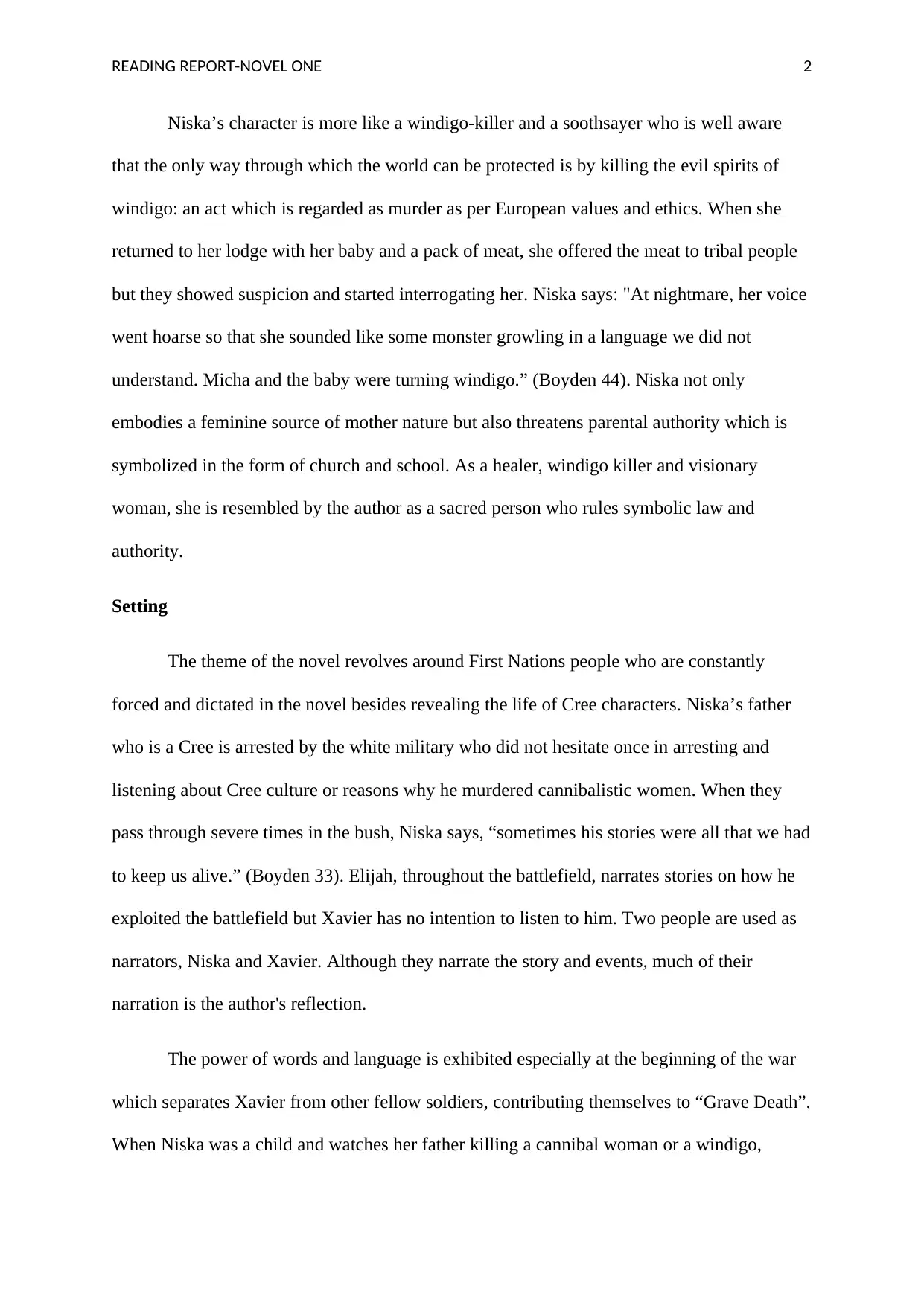
READING REPORT-NOVEL ONE 2
Niska’s character is more like a windigo-killer and a soothsayer who is well aware
that the only way through which the world can be protected is by killing the evil spirits of
windigo: an act which is regarded as murder as per European values and ethics. When she
returned to her lodge with her baby and a pack of meat, she offered the meat to tribal people
but they showed suspicion and started interrogating her. Niska says: "At nightmare, her voice
went hoarse so that she sounded like some monster growling in a language we did not
understand. Micha and the baby were turning windigo.” (Boyden 44). Niska not only
embodies a feminine source of mother nature but also threatens parental authority which is
symbolized in the form of church and school. As a healer, windigo killer and visionary
woman, she is resembled by the author as a sacred person who rules symbolic law and
authority.
Setting
The theme of the novel revolves around First Nations people who are constantly
forced and dictated in the novel besides revealing the life of Cree characters. Niska’s father
who is a Cree is arrested by the white military who did not hesitate once in arresting and
listening about Cree culture or reasons why he murdered cannibalistic women. When they
pass through severe times in the bush, Niska says, “sometimes his stories were all that we had
to keep us alive.” (Boyden 33). Elijah, throughout the battlefield, narrates stories on how he
exploited the battlefield but Xavier has no intention to listen to him. Two people are used as
narrators, Niska and Xavier. Although they narrate the story and events, much of their
narration is the author's reflection.
The power of words and language is exhibited especially at the beginning of the war
which separates Xavier from other fellow soldiers, contributing themselves to “Grave Death”.
When Niska was a child and watches her father killing a cannibal woman or a windigo,
Niska’s character is more like a windigo-killer and a soothsayer who is well aware
that the only way through which the world can be protected is by killing the evil spirits of
windigo: an act which is regarded as murder as per European values and ethics. When she
returned to her lodge with her baby and a pack of meat, she offered the meat to tribal people
but they showed suspicion and started interrogating her. Niska says: "At nightmare, her voice
went hoarse so that she sounded like some monster growling in a language we did not
understand. Micha and the baby were turning windigo.” (Boyden 44). Niska not only
embodies a feminine source of mother nature but also threatens parental authority which is
symbolized in the form of church and school. As a healer, windigo killer and visionary
woman, she is resembled by the author as a sacred person who rules symbolic law and
authority.
Setting
The theme of the novel revolves around First Nations people who are constantly
forced and dictated in the novel besides revealing the life of Cree characters. Niska’s father
who is a Cree is arrested by the white military who did not hesitate once in arresting and
listening about Cree culture or reasons why he murdered cannibalistic women. When they
pass through severe times in the bush, Niska says, “sometimes his stories were all that we had
to keep us alive.” (Boyden 33). Elijah, throughout the battlefield, narrates stories on how he
exploited the battlefield but Xavier has no intention to listen to him. Two people are used as
narrators, Niska and Xavier. Although they narrate the story and events, much of their
narration is the author's reflection.
The power of words and language is exhibited especially at the beginning of the war
which separates Xavier from other fellow soldiers, contributing themselves to “Grave Death”.
When Niska was a child and watches her father killing a cannibal woman or a windigo,
⊘ This is a preview!⊘
Do you want full access?
Subscribe today to unlock all pages.

Trusted by 1+ million students worldwide
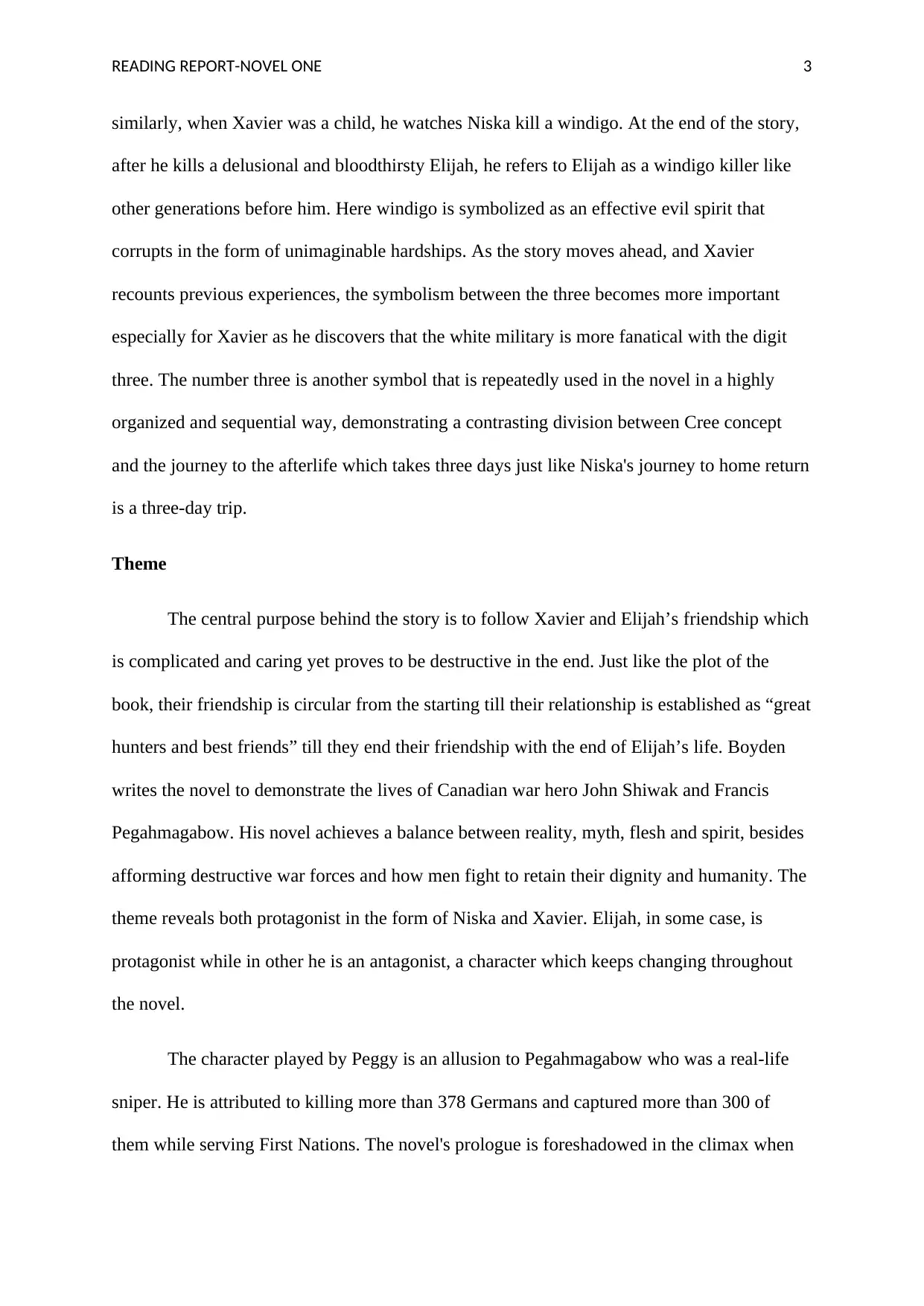
READING REPORT-NOVEL ONE 3
similarly, when Xavier was a child, he watches Niska kill a windigo. At the end of the story,
after he kills a delusional and bloodthirsty Elijah, he refers to Elijah as a windigo killer like
other generations before him. Here windigo is symbolized as an effective evil spirit that
corrupts in the form of unimaginable hardships. As the story moves ahead, and Xavier
recounts previous experiences, the symbolism between the three becomes more important
especially for Xavier as he discovers that the white military is more fanatical with the digit
three. The number three is another symbol that is repeatedly used in the novel in a highly
organized and sequential way, demonstrating a contrasting division between Cree concept
and the journey to the afterlife which takes three days just like Niska's journey to home return
is a three-day trip.
Theme
The central purpose behind the story is to follow Xavier and Elijah’s friendship which
is complicated and caring yet proves to be destructive in the end. Just like the plot of the
book, their friendship is circular from the starting till their relationship is established as “great
hunters and best friends” till they end their friendship with the end of Elijah’s life. Boyden
writes the novel to demonstrate the lives of Canadian war hero John Shiwak and Francis
Pegahmagabow. His novel achieves a balance between reality, myth, flesh and spirit, besides
afforming destructive war forces and how men fight to retain their dignity and humanity. The
theme reveals both protagonist in the form of Niska and Xavier. Elijah, in some case, is
protagonist while in other he is an antagonist, a character which keeps changing throughout
the novel.
The character played by Peggy is an allusion to Pegahmagabow who was a real-life
sniper. He is attributed to killing more than 378 Germans and captured more than 300 of
them while serving First Nations. The novel's prologue is foreshadowed in the climax when
similarly, when Xavier was a child, he watches Niska kill a windigo. At the end of the story,
after he kills a delusional and bloodthirsty Elijah, he refers to Elijah as a windigo killer like
other generations before him. Here windigo is symbolized as an effective evil spirit that
corrupts in the form of unimaginable hardships. As the story moves ahead, and Xavier
recounts previous experiences, the symbolism between the three becomes more important
especially for Xavier as he discovers that the white military is more fanatical with the digit
three. The number three is another symbol that is repeatedly used in the novel in a highly
organized and sequential way, demonstrating a contrasting division between Cree concept
and the journey to the afterlife which takes three days just like Niska's journey to home return
is a three-day trip.
Theme
The central purpose behind the story is to follow Xavier and Elijah’s friendship which
is complicated and caring yet proves to be destructive in the end. Just like the plot of the
book, their friendship is circular from the starting till their relationship is established as “great
hunters and best friends” till they end their friendship with the end of Elijah’s life. Boyden
writes the novel to demonstrate the lives of Canadian war hero John Shiwak and Francis
Pegahmagabow. His novel achieves a balance between reality, myth, flesh and spirit, besides
afforming destructive war forces and how men fight to retain their dignity and humanity. The
theme reveals both protagonist in the form of Niska and Xavier. Elijah, in some case, is
protagonist while in other he is an antagonist, a character which keeps changing throughout
the novel.
The character played by Peggy is an allusion to Pegahmagabow who was a real-life
sniper. He is attributed to killing more than 378 Germans and captured more than 300 of
them while serving First Nations. The novel's prologue is foreshadowed in the climax when
Paraphrase This Document
Need a fresh take? Get an instant paraphrase of this document with our AI Paraphraser
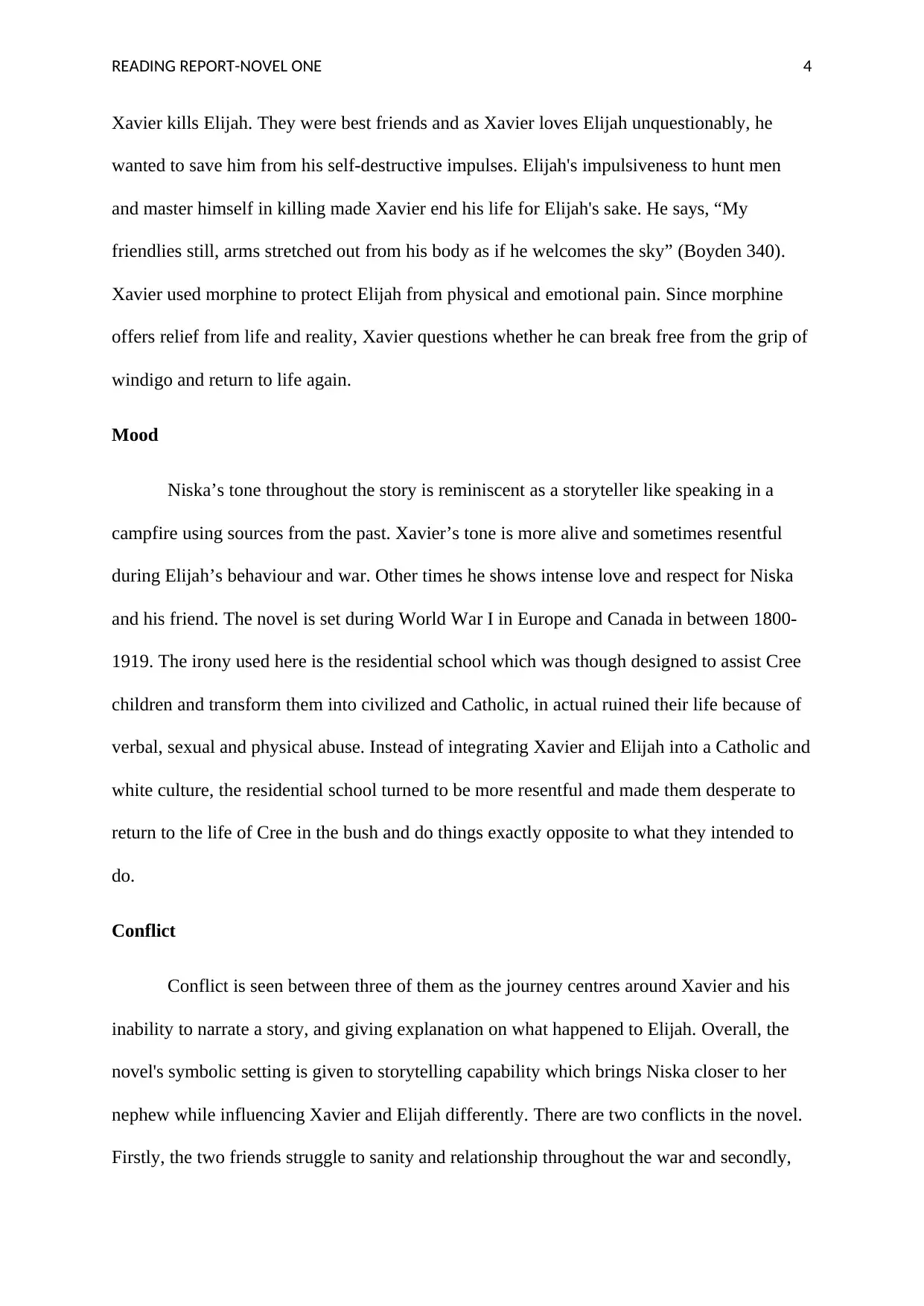
READING REPORT-NOVEL ONE 4
Xavier kills Elijah. They were best friends and as Xavier loves Elijah unquestionably, he
wanted to save him from his self-destructive impulses. Elijah's impulsiveness to hunt men
and master himself in killing made Xavier end his life for Elijah's sake. He says, “My
friendlies still, arms stretched out from his body as if he welcomes the sky” (Boyden 340).
Xavier used morphine to protect Elijah from physical and emotional pain. Since morphine
offers relief from life and reality, Xavier questions whether he can break free from the grip of
windigo and return to life again.
Mood
Niska’s tone throughout the story is reminiscent as a storyteller like speaking in a
campfire using sources from the past. Xavier’s tone is more alive and sometimes resentful
during Elijah’s behaviour and war. Other times he shows intense love and respect for Niska
and his friend. The novel is set during World War I in Europe and Canada in between 1800-
1919. The irony used here is the residential school which was though designed to assist Cree
children and transform them into civilized and Catholic, in actual ruined their life because of
verbal, sexual and physical abuse. Instead of integrating Xavier and Elijah into a Catholic and
white culture, the residential school turned to be more resentful and made them desperate to
return to the life of Cree in the bush and do things exactly opposite to what they intended to
do.
Conflict
Conflict is seen between three of them as the journey centres around Xavier and his
inability to narrate a story, and giving explanation on what happened to Elijah. Overall, the
novel's symbolic setting is given to storytelling capability which brings Niska closer to her
nephew while influencing Xavier and Elijah differently. There are two conflicts in the novel.
Firstly, the two friends struggle to sanity and relationship throughout the war and secondly,
Xavier kills Elijah. They were best friends and as Xavier loves Elijah unquestionably, he
wanted to save him from his self-destructive impulses. Elijah's impulsiveness to hunt men
and master himself in killing made Xavier end his life for Elijah's sake. He says, “My
friendlies still, arms stretched out from his body as if he welcomes the sky” (Boyden 340).
Xavier used morphine to protect Elijah from physical and emotional pain. Since morphine
offers relief from life and reality, Xavier questions whether he can break free from the grip of
windigo and return to life again.
Mood
Niska’s tone throughout the story is reminiscent as a storyteller like speaking in a
campfire using sources from the past. Xavier’s tone is more alive and sometimes resentful
during Elijah’s behaviour and war. Other times he shows intense love and respect for Niska
and his friend. The novel is set during World War I in Europe and Canada in between 1800-
1919. The irony used here is the residential school which was though designed to assist Cree
children and transform them into civilized and Catholic, in actual ruined their life because of
verbal, sexual and physical abuse. Instead of integrating Xavier and Elijah into a Catholic and
white culture, the residential school turned to be more resentful and made them desperate to
return to the life of Cree in the bush and do things exactly opposite to what they intended to
do.
Conflict
Conflict is seen between three of them as the journey centres around Xavier and his
inability to narrate a story, and giving explanation on what happened to Elijah. Overall, the
novel's symbolic setting is given to storytelling capability which brings Niska closer to her
nephew while influencing Xavier and Elijah differently. There are two conflicts in the novel.
Firstly, the two friends struggle to sanity and relationship throughout the war and secondly,
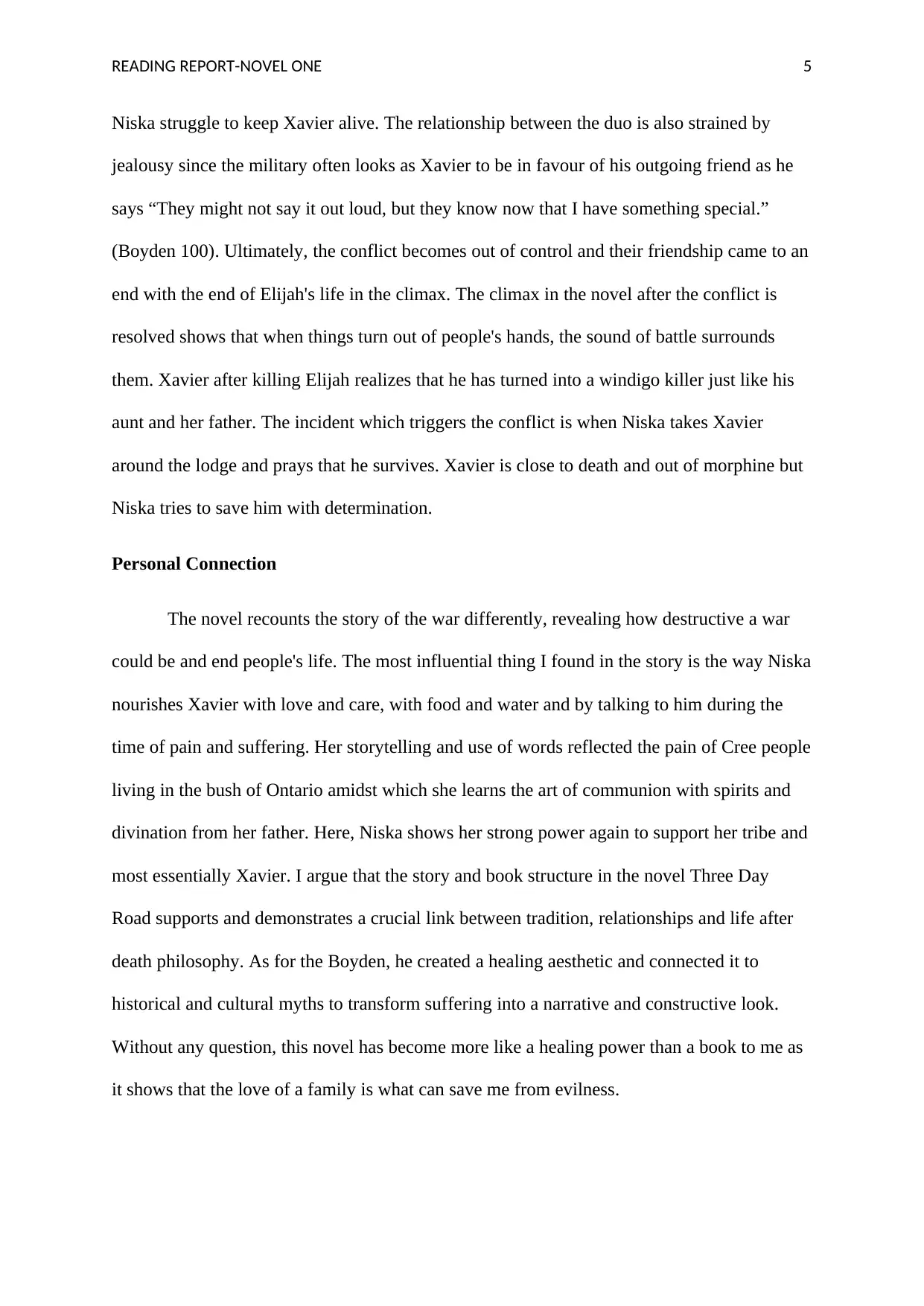
READING REPORT-NOVEL ONE 5
Niska struggle to keep Xavier alive. The relationship between the duo is also strained by
jealousy since the military often looks as Xavier to be in favour of his outgoing friend as he
says “They might not say it out loud, but they know now that I have something special.”
(Boyden 100). Ultimately, the conflict becomes out of control and their friendship came to an
end with the end of Elijah's life in the climax. The climax in the novel after the conflict is
resolved shows that when things turn out of people's hands, the sound of battle surrounds
them. Xavier after killing Elijah realizes that he has turned into a windigo killer just like his
aunt and her father. The incident which triggers the conflict is when Niska takes Xavier
around the lodge and prays that he survives. Xavier is close to death and out of morphine but
Niska tries to save him with determination.
Personal Connection
The novel recounts the story of the war differently, revealing how destructive a war
could be and end people's life. The most influential thing I found in the story is the way Niska
nourishes Xavier with love and care, with food and water and by talking to him during the
time of pain and suffering. Her storytelling and use of words reflected the pain of Cree people
living in the bush of Ontario amidst which she learns the art of communion with spirits and
divination from her father. Here, Niska shows her strong power again to support her tribe and
most essentially Xavier. I argue that the story and book structure in the novel Three Day
Road supports and demonstrates a crucial link between tradition, relationships and life after
death philosophy. As for the Boyden, he created a healing aesthetic and connected it to
historical and cultural myths to transform suffering into a narrative and constructive look.
Without any question, this novel has become more like a healing power than a book to me as
it shows that the love of a family is what can save me from evilness.
Niska struggle to keep Xavier alive. The relationship between the duo is also strained by
jealousy since the military often looks as Xavier to be in favour of his outgoing friend as he
says “They might not say it out loud, but they know now that I have something special.”
(Boyden 100). Ultimately, the conflict becomes out of control and their friendship came to an
end with the end of Elijah's life in the climax. The climax in the novel after the conflict is
resolved shows that when things turn out of people's hands, the sound of battle surrounds
them. Xavier after killing Elijah realizes that he has turned into a windigo killer just like his
aunt and her father. The incident which triggers the conflict is when Niska takes Xavier
around the lodge and prays that he survives. Xavier is close to death and out of morphine but
Niska tries to save him with determination.
Personal Connection
The novel recounts the story of the war differently, revealing how destructive a war
could be and end people's life. The most influential thing I found in the story is the way Niska
nourishes Xavier with love and care, with food and water and by talking to him during the
time of pain and suffering. Her storytelling and use of words reflected the pain of Cree people
living in the bush of Ontario amidst which she learns the art of communion with spirits and
divination from her father. Here, Niska shows her strong power again to support her tribe and
most essentially Xavier. I argue that the story and book structure in the novel Three Day
Road supports and demonstrates a crucial link between tradition, relationships and life after
death philosophy. As for the Boyden, he created a healing aesthetic and connected it to
historical and cultural myths to transform suffering into a narrative and constructive look.
Without any question, this novel has become more like a healing power than a book to me as
it shows that the love of a family is what can save me from evilness.
⊘ This is a preview!⊘
Do you want full access?
Subscribe today to unlock all pages.

Trusted by 1+ million students worldwide

READING REPORT-NOVEL ONE 6
Work cited
Boyden, Joseph. Three Day Road. Toronto: Penguin, 2005.
Work cited
Boyden, Joseph. Three Day Road. Toronto: Penguin, 2005.
1 out of 7
Related Documents
Your All-in-One AI-Powered Toolkit for Academic Success.
+13062052269
info@desklib.com
Available 24*7 on WhatsApp / Email
![[object Object]](/_next/static/media/star-bottom.7253800d.svg)
Unlock your academic potential
Copyright © 2020–2025 A2Z Services. All Rights Reserved. Developed and managed by ZUCOL.



